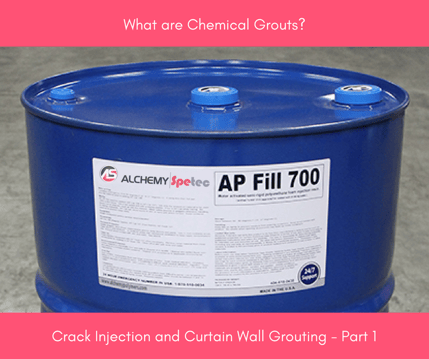 What are Chemical Grouts?
What are Chemical Grouts?
Chemical grouts are water reacted or chemically reacted materials that are designed to shut down active water leaks, stabilize soils and lift slabs in various structures.
Some of these materials are formulated to stop high volume leaks (2000 gpm) or used to stop small leaks in water and waste water treatment tanks.
Geotechnical applications include but are not limited to:
Soil Stabilization, Railroad Ballast Rock Stabilization, Tunnels, Mines, and Seawall Repairs
Why Chemical Grouts?
Chemical grouting serves as the most efficient permanent repair procedure. It also features little disruption to the local communities as repair times are not extensive. As you all know, leak repairs must be preformed prior to coatings. But why is chemical grouting important? Grouting is the only permanent repair procedure that seals leaks from the positive side (where the water’s coming from) and fills voids in record times.
Hydrophilic & Hydrophobic
It is crucial to understand the basic differences in hydrophilic, hydrophobic, and multiple component chemical grouts. Choosing the correct repair materials for a job is very important. Let’s dive into the specifics to gather a deeper understanding of the different types of polyurethane grouts.
Hydrophilic
Hydrophilic grouts injected in a confined space shrink more but create a better bond with the substrate. Hydrophilic chemical grouts are resilient and flexible after full cure and allow movement within structures without causing damage to the seal or bond.
Alchemy-Spetec Product Examples: AP Seal 500, PU GT350
|
• No catalyst needed |
• Great bond |
|
• Flexible |
• Absorbs water |
|
• Needs water to react |
• Medium to high shrinkage |
|
• Resin only |
• Medium expansion |
|
• Needs to be subjected to water |
• Foam or gel |
Hydrophobic
Hydrophobic grouts injected in a confined space have very little shrinkage, but depend much more on expansion to create their bond with the substrate. Hydrophobic chemical grout has a low viscosity characteristic that permeates loose and non-consolidated soils readily and effectively.
Alchemy-Spetec Product Examples: AP Fill 700, PU F400, PU H100
|
• Uses a catalyst |
• Repels water |
|
• Grout will not shrink |
• Low shrinkage |
|
• Needs water to react |
• High expansion |
|
• Rigid and flexible |
• Adjustable set times |
|
• Resin + catalyst |
• Foam |
Multi Component
Multi-component closed cell foam maintains its physical form and is not subject to shrinkage due to wet/dry cycles. It is a rapid curing; self-leveling concrete repair material perfect when minimal down time is required.
Alchemy-Spetec Product Example: AP Lift 475
|
• Rigid |
• High density |
|
• Flexible |
• High compressive |
|
• High expansion |
• Strength |
|
• Rapid set times |
• Closed cell |
Cured polyurethane is harmless for the environment and resistant to biological attacks.


